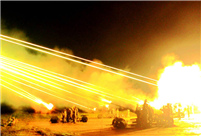

TOKYO, June 9 -- Lawmakers in Japan's ruling Liberal Democratic Party of Japan (LDP) were seeking the right to a non- partisan vote when the party comes to decide on Prime Minister Shinzo Abe's controversial new national security bills and it emerged following the LDP's General Council meeting Tuesday.
The calls by some LDP lawmakers came as the bills to historically revise the nation's security legislation and further loosen the reins on Japan's Self-Defense Forces (SDF), to operate without geographical constraints and under an ambiguous understanding as to exactly what constitutes the right to exercise collective self-defense, were deemed unconstitutional by leading constitutional scholars.
At a session of the Lower House Commission on the Constitution held last week at which three scholars were asked to provide testimony ahead of Abe's bid to see the nation's security forces play a greater role on a global scale, all scholars asked to give evidence concluded that the bills related to the new security legislation submitted to parliament were unconstitutional.
The ruling party's general council meeting held Tuesday saw its former chairperson Yuya Niwa stating that a slew of opinion polls also revealed that the public is also staunchly opposed to the legislation and immensely displeased with the government's wishy-washy explanations of what the new and most radical postwar security shift actually entails.
Questions put to Abe, also leader of the LDP, regarding the precise scenarios in which Japanese forces would be allowed to exercise the right to collective self-defense have repeatedly been answered ambiguously, by the hawkish leader.
Indeed Abe, a rightwing nationalist and keen proponent of remilitarizing Japan, has contradicted himself over the issue, saying at first that the lives of SDF personnel would not be put at risk if the new bills are enacted, in contrast to the U.S.' view that it expects Japan's forces to put"boots on the ground" in potential conflicts in the Middle East, closer to home on the Korean Peninsular, or, in territorial waters in East Asia, which are currently the center of great deal of political patter.
Abe, finally conceding that it was the duty of SDF members to potentially have to sacrifice their lives to protect Japanese civilians and territory, backtracked on the issue and the predominantly pacifist-loving public, according to the latest polls, found this a very bitter and disappointing pill to swallow.
According to a poll taken by the Yomiuri newspaper this month, almost 60 percent of citizens said they oppose the passage of the security bills during this parliamentary session, which is an 11 percent rise from the same survey conducted a month earlier, and comes on the heels of a number of high-profile protests comprised of civilians and lawmakers opposed to the bills, at the Diet building in Tokyo and at other notable locations around the capital and indeed the nation.
Such is the hoopla over the controversial bills that it would see Abe's administration is now going to forego a plan to have the bills passed by June 24, when the current parliamentary session ends, and look for an extension in light of the public's rejection and unconstitutionality of the bills.
The Mainichi newspaper said that Abe will now look to extend the deliberations and attempt to pass the bills from early August onward. The popular daily said that the unconstitutionality of the bills and level of opposition party criticism had factored into the ruling party's decision to put the breaks on its contested move to push the bills forward.
A further thorn in Abe's side is his own party lawmakers calling for the right to vote free of the ruling party's decision in the Diet. A former minister in charge of administrative reform, Seiichiro Murakami, who also holds a degree in law from Tokyo University, said Tuesday that lawmakers should not be"bound by compulsory adherence to the party's decision when voting on the bills."
But what really put the cat among the pigeons was a commission session on June 4, at which all three constitutional law scholars said the fact that the legislative package would"widen the range of activities by the Self-Defense Forces to allow for the exercise of the right to collective self-defense,"and was thus unconstitutional.
Specifically, Yasuo Hasebe, professor of constitutional law at Waseda University, who himself was recommended by ruling party said"It is improper to allow for the exercise of the right to collective self-defense based on the logic of the Constitution's Article 9, which only permits the right to individual self-defense. "
Setsu Kobayashi, a professor emeritus of constitutional law at Keio University, who is widely known to be a supporter of revising Japan's decades-old pacific Constitution, even concurred that" the security legislation allowing the exercise of the right to collective self-defense is unconstitutional."Kobayashi added that "Paragraph 2 of Article 9 does not grant any legal standing for military activities abroad,"and reiterated that going to war abroad to help a friendly nation is"a violation of Article 9."
Abe's immediate plans unraveled further as Eiji Sasada, a constitutional law professor at Waseda University, highlighted the fact that the accepted interpretation, rather than the Cabinet's recent reinterpretation of the Constitution, as followed by past governments, although being on very"delicate footing" was still "within the limits of what was acceptable." "The security legislation is unconstitutional because it clearly exceeds that past interpretation,"said Sasada.
While Abe's top government spokesperson Chief Cabinet Secretary Yoshihide Suga has sought to do damage control by suggesting that while there would be experts on constitutional law that would find the bills unconstitutional, there were also plenty who would find them within the bounds of the Constitution.
This was countered by a scores of multi-party-based constitutional legal experts coming forward to state their cases for the new bills being unconstitutional, along the same lines as the scholars'findings.
Abe himself has rejected the opinions that the national security bills submitted to the Diet are unconstitutional, stating recently that the basic principle of how to interpret the Constitution has not changed and more poignantly that a "Supreme Court ruling says Japan can take the measures necessary to defend itself in order to maintain peace and security and ensure its survival."
Abe said defending itself is a legitimate use of a nation's inherent right and is one of the basic principles of the Constitution, but the hawkish leader omitted to comment on the fact that the security bills he's looking to have enacted go well beyond the scope of a nation merely defending itself and have moved into the realm of borderless military deployments in potentially active theaters in the Middle East, as has been cited, and acting at the behest of the United States, with SDF troops expected to put"boots on the ground"should the U.S. deem such as response is necessary by Japan as a security ally.
 School life of students in a military college
School life of students in a military college PLA soldiers operate antiaircraft guns in drill
PLA soldiers operate antiaircraft guns in drill Mysterious “sky road” in Mount Dawagengzha
Mysterious “sky road” in Mount Dawagengzha J-11 fighters in air exercise
J-11 fighters in air exercise Top 16 Chinese cities with the best air quality in 2014
Top 16 Chinese cities with the best air quality in 2014 PLA helicopters travel 2,000 kilometers in maneuver drill
PLA helicopters travel 2,000 kilometers in maneuver drill PLA soldiers conduct 10-kilometer long range raid
PLA soldiers conduct 10-kilometer long range raid Stars who aced national exams
Stars who aced national exams
 Hefei-Fuzhou railway line put into trial operation
Hefei-Fuzhou railway line put into trial operation Fly girls: a history of China's stewardesses
Fly girls: a history of China's stewardesses Does Tokyo’s attitude matter to AIIB?
Does Tokyo’s attitude matter to AIIB? Dreaming of stars
Dreaming of stars Dangerous deals
Dangerous dealsDay|Week